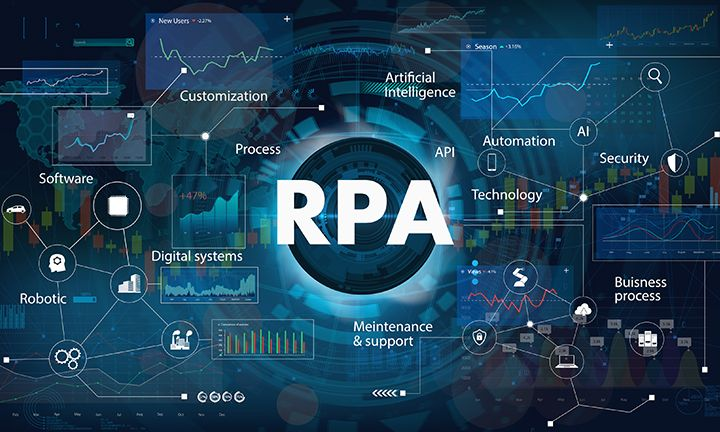Robotic Process Automation That All You Need To Know

Businesses have realized the dire need to become more productive and efficient and achieve better results with fewer resources. Each day your employees strive to complete countless time-consuming business processes that demand accuracy and speed. But there is a better and much more efficient way. Humans are prone to error, and doing the same, mundane task over and over can be a source of frustration as well as dissatisfaction with work. Automating manual, rule-based tasks has shown to enhance employee engagement, productivity, and regulatory compliance. As a result, RPA could help your employees reduce time spent on routine work by up to 90% and free them for more productive tasks. In this article we’d take you through all that you’d need to know about RPA or Robotic Process Automation.
Evolution of RPA
Although the term robotic process automation can be traced back to the early 2000s, RPA emerged from three key technologies; Screen scraping, workflow automation and artificial intelligence.
Screen scraping is the process of managing screen display data from a legacy application so that the data can be represented by a more modern user interface. Workflow automation software reduces the demand for manual data entry and increases order fulfillment rates, involve increased speed, efficiency and accuracy.
Artificial intelligence (AI) is a broad field of computer science concerned with creating intelligent machines that can perform tasks that would normally require human intelligence. Integrating AI with advanced ERP Software can plug this gap by assisting businesses to leverage huge volumes of structured data. Also, it provides pattern-based intelligence to automate several tasks in which employees are involved.
What is the Meaning of RPA?
Robotic process automation (RPA) is the application of software (or software robots) that automate high-volume, repetitive tasks.
Advantages for Using RPA

RPAis a type of software that simulates the activity of a human being that is mostly rule based and does not require much discretion. It can do repetitive tasks more swiftly, precisely, and tirelessly than humans, freeing them to focus their time on more productive tasks.
There are numerous advantages of RPA –
- RPA is cost-effective as it frees the employees from their mundane tasks, and enables them to focus on more important tasks and projects, thereby increasing their productivity tremendously.
- RPA leads to high accuracy and improved customer interaction that further leads to increased customer retention.
- RPA enables the processes to be performed much more rapidly, saving the organizations thousands of man hours each month.
- Helps an organization become a truly digital organization by automating processes.
Best Applications of RPA
Some of the best applications of RPA include the following:
- Customer service : RPA can help companies offer better client support by automating contact Centre tasks, including checking e-signatures, Uploading scanned documents and assessing information for automatic approvals or rejections.
- Accounting: Firms can utilize RPA for overall bookkeeping, transactional budgeting and reporting.
- Financial services: Firms in the financial services sector can leverage RPA for foreign exchange payments, automating account openings and closings, handling audit requests.
- Healthcare: Healthcare organizations can leverage RPA for various activities like handling Patient documents, claims, customer support, account management, billing, Reporting and analytics.
- Human resources: RPA can automate HR tasks, such as onboarding and off-boarding, updating employee information, timesheet submissions, and more.
- Supply chain management: RPA can be used for acquisition, automating order processing and payments, controlling stock levels and tracing shipments.
Features of RPA software
When business leaders look for RPA technologies, they should look for the following features in a RPA software:
Scalability: Organizations shouldn’t select RPA software that needs them to expand applications robots to desktops or virtualized environments. Rather they ought to choose a RPA tool which can be centrally controlled and scale massively.
Time Efficiency: Businesses should have the ability to create and test new Robotic processes in a couple of hours or less, as well as optimize the bots to work immediately.
Uniformity: Organizations should look for products that are simple enough so that any employee in the company can create and utilize them to handle several kinds of work, such as extracting data and turning material into information that permits leaders to make informed company decisions.
Intelligence: RPA tools can maintain easy task-based actions, write and read to any data source, and take the advantage of more innovative learning to further enhance automation.
Enterprise-class: Businesses should look for tools that are made from the ground up to get enterprise-grade scalability, security and manageability.
Future of RPA
Robotic process automation is enabling business processes automation in virtually every sector by streamlining data entry and other redundant, monotonous, time-consuming tasks.
A study conducted by Grand View Research has found that ‘The RPA market is presently valued at USD 1.1 Billion, and is anticipated to witness a CAGR of 33.6% from 2020 to 2027.
The numbers signify a huge surge in the automation world in the near future.
Rapid advancement in machine learning, Artificial Intelligence, and Natural Language Processing are allowing allow RPA tools to benefit from cognitive skills, understand unstructured strains of data, and integrate them with existing systems.
Conclusion
As we know RPA has already a huge number of use-cases for all the businesses that are aiming to reduce their costs and increase efficiency. It seeks to strengthen human resources, enabling them to do more with their time, without wasting it on mundane tasks.
Our highly qualified RPA specialists can assist you to leverage RPA can create a new digital workforce for your organization that works tirelessly 24/7.
To know more, contact us at marketing@ebizframe.com or fill in the form to schedule a demo.




